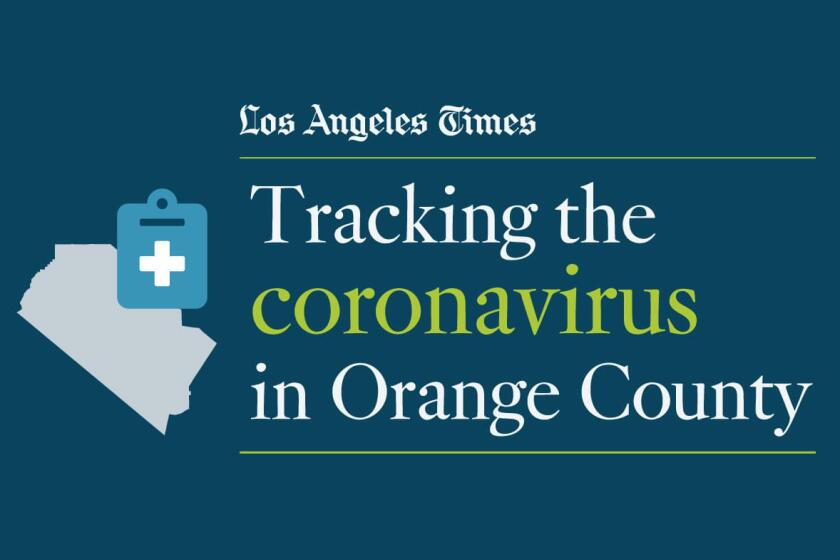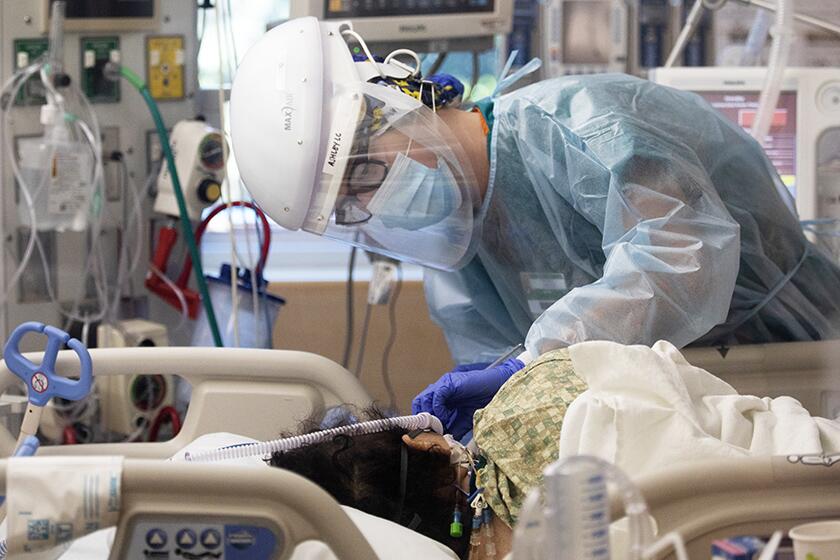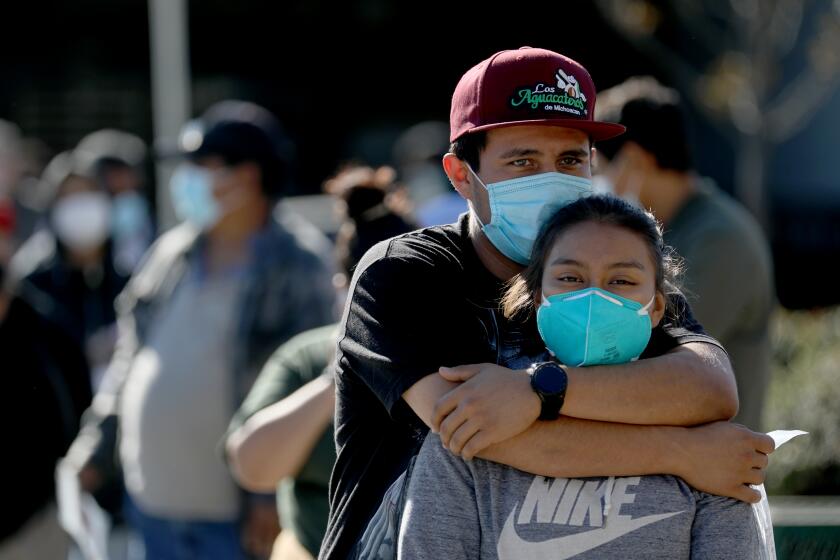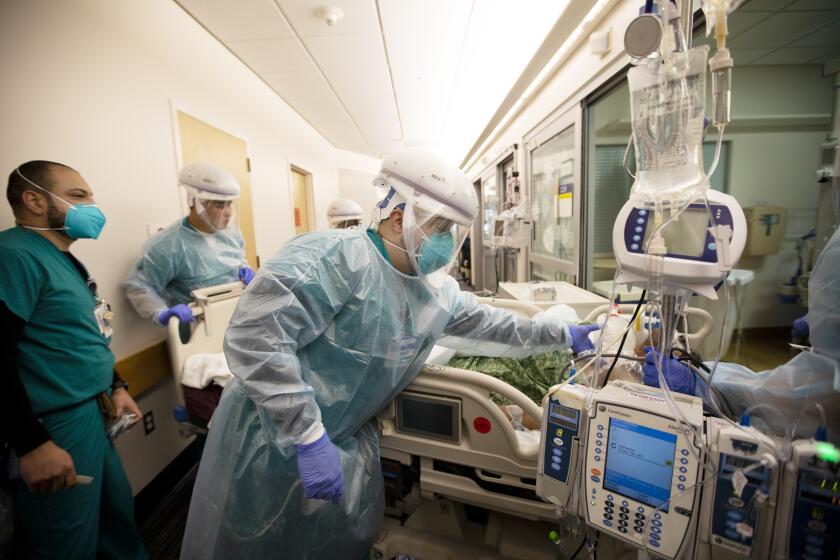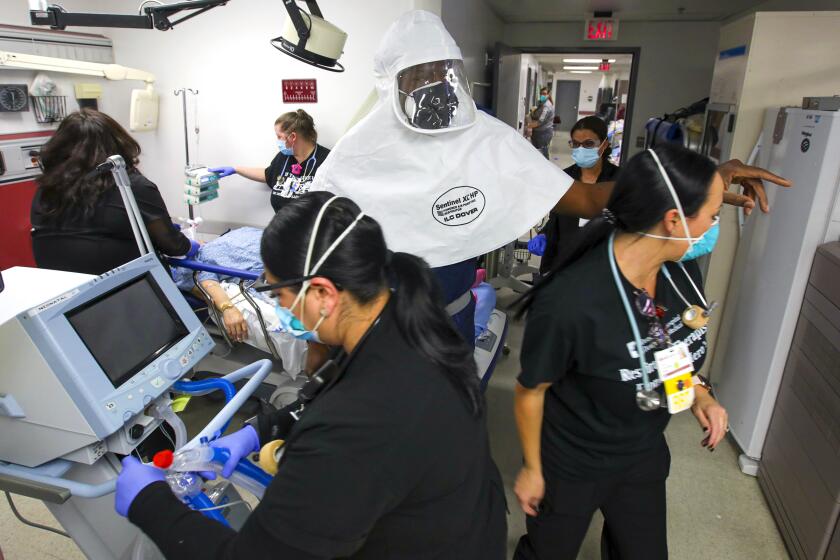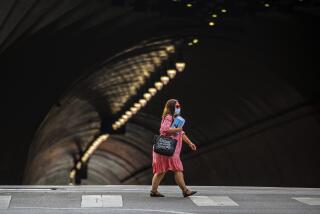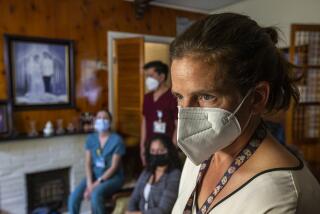Orange County obliterates coronavirus record as surging infections strain state hospitals
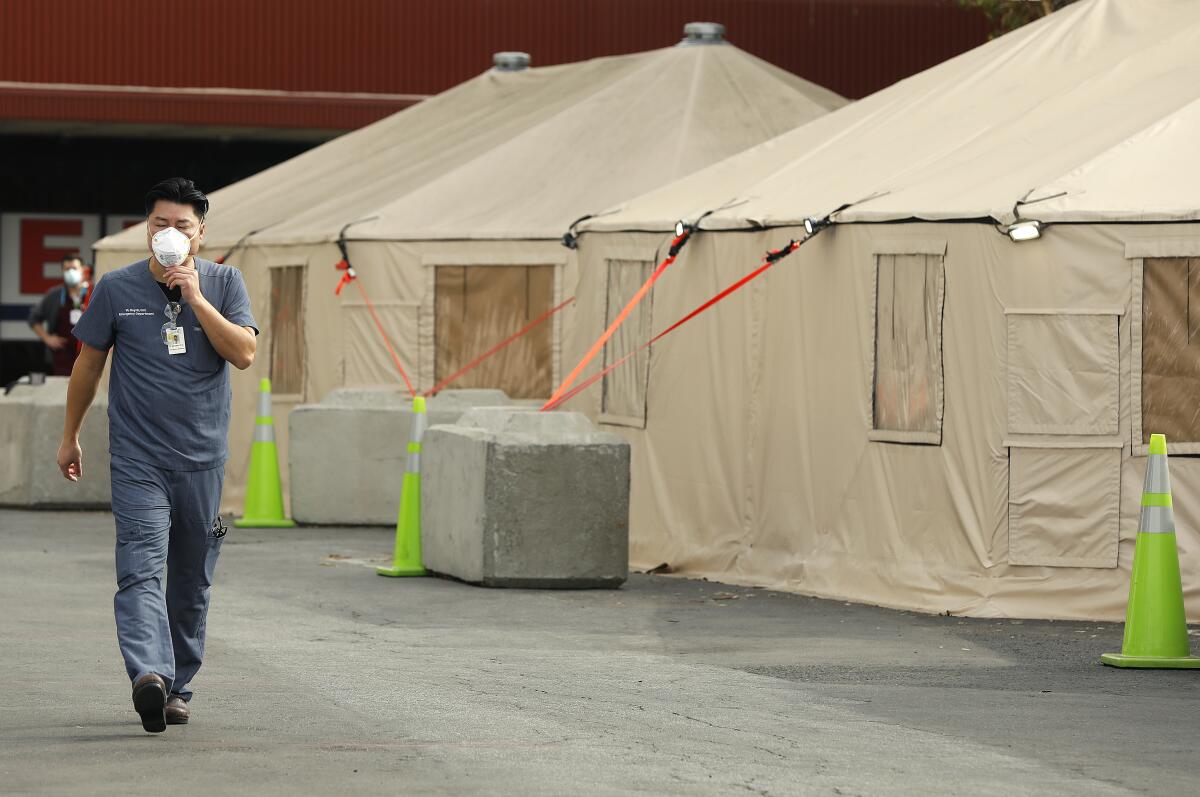
Orange County reported its highest daily number of coronavirus cases over the weekend, the latest record to fall amid the most brutal barrage from a disease that is now infecting, hospitalizing and killing Californians at levels never seen before.
The 4,606 new coronavirus infections announced Sunday shattered the county’s previous one-day high of 3,445, according to data compiled by The Times. There have been 3,000-plus new daily cases logged countywide only five times throughout the entire pandemic — all since Dec. 13.
Over the last week, Orange County has seen roughly 693 new coronavirus cases per 100,000 residents, The Times’ data show — far lower than other Southern California counties but still 14th highest in the state.
“Our hearts break for our neighbors lost to this pandemic,” county health officials wrote Sunday on Twitter. “We ALL have the power to protect each other and #stopthesurge.”
More than 124,000 Orange County residents have been infected throughout the pandemic, and officials say nearly 73,000 of those have recovered.
Almost 1,800 county residents have died from COVID-19.
The latest maps and charts on the spread of COVID-19 in Orange County, including cases, deaths, closures and restrictions.
Orange County is far from alone in rewriting the coronavirus record books. The pandemic’s worst wave is washing over the state and hitting Southern California especially hard.
Overall, the region — which the state defines as Imperial, Inyo, Los Angeles, Mono, Orange, Riverside, San Bernardino, San Diego, San Luis Obispo, Santa Barbara and Ventura counties — has recorded 828 new coronavirus cases per 100,000 residents over the last seven days, Times data show.
That figure is easily the highest of the five state-outlined regions and is more than double the per-capita caseloads seen in rural Northern California and the Bay Area.
ICU availability in Southern California at 0%, and the crisis is expected to get worse, officials warn.
Along with Orange County, four others in Southern California rank among the top 14 statewide in terms of newly confirmed infections per 100,000 residents in the last week. San Bernardino is second, at 1,448; Riverside is fourth, with 1,180; Imperial is seventh at 1,045 and Los Angeles is ninth, at 973.
“The number of infections in our county, in our surrounding counties, has been rising every day,” Dr. Clayton Chau, Orange County’s health officer and Health Care Agency director, said last week. “Every day, we break the record, the number of people who have been infected. So I’m pleading with the community: Please, please do not gather. And make sure you follow the public health guidance because our hospitals are now bombarded.”
Just because counties don’t rank among the hardest-hit in terms of new infections doesn’t mean they’re escaping the latest surge unscathed. San Diego County health officials on Friday also reported a record number of COVID-19 cases, 3,611.
“I urge San Diegans to follow the public health orders, avoid gatherings and wear a facial covering whenever they leave their residence so we can get this virus under control,” Dr. Wilma Wooten, the county’s public health officer, said in a statement.
While many of those infected with the coronavirus may experience only mild symptoms, or even none at all, a significant proportion — state officials have estimated about 12% — will fall ill enough to require hospitalization within two to three weeks.
The state’s March restrictions flattened the coronavirus curve, but the latest order must tame an infection rate that is already wildly out of control.
In other words, the ramifications of these record case counts won’t ripple through the healthcare system for a few more weeks — a frightening prospect, given that hospitals and intensive care units are already inundated with COVID-19 patients.
On Sunday, the most recent day for which complete data are available, there were record-high numbers of coronavirus-positive patients hospitalized (17,190) and in intensive care (3,644) statewide.
The situation is particularly precarious in ICUs, which are needed to care for the sickest patients. ICU availability has cratered amid the relentless COVID-19 surge, and bottomed out at 0% in both Southern California and the San Joaquin Valley.
“I’m not going to sugarcoat this: We are getting crushed,” said Dr. Brad Spellberg, chief medical officer at Los Angeles County-USC Medical Center.
Doctors are preparing to ration care as COVID-19 patients overwhelm healthcare systems.
Hospitals are already having to take steps to keep up with the influx of ICU patients — including placing them in other parts of hospitals not designed for that purpose, clearing out critical care wards of patients who can survive elsewhere and in some cases keeping patients on ambulances for as long as eight hours until space is available.
The concern, though, is that there eventually may be too many critically ill patients for the limited numbers of available ICU doctors and nurses — a chilling prospect that could result in patients not getting the care they need and, potentially, increases in mortality.
Many hospitals are preparing for the possibility of rationing care in the coming weeks as the number of patients exceeds their staffs’ abilities to care for them.
“Think New York in April. Think Italy in March,” Spellberg said. “That’s how bad things could get.”
Already, hospitals are struggling to keep up with the pace of new COVID-19 patients. With the surge showing no signs of slowing down, L.A. County facilities are preparing for how to allocate care in a crisis situation.
Already, COVID-19 is killing more Californians than ever before. The state has averaged 233 daily deaths over the last week, more than double the number two weeks ago.
More than 2,700 Californians have died from COVID-19 over the last 14 days, a staggering number that accounts for 12% of the state’s 22,600-plus fatalities.
Officials have said the surge is being fueled, at least in part, by people ignoring public health guidance and gathering with family and friends to celebrate Thanksgiving.
Significant numbers of people choosing to do the same for the winter holidays, officials warn, will only pour gasoline on a pandemic that’s already blazing out of control.
“I have yet to see any clear signals that things are slowing down, and I’m very concerned about the next two months,” said Dr. Timothy Brewer, an epidemiologist at UCLA.
Times staff writers Alex Wigglesworth, Soumya Karlamangla and Adam Elmahrek contributed to this report.
More to Read
Sign up for Essential California
The most important California stories and recommendations in your inbox every morning.
You may occasionally receive promotional content from the Los Angeles Times.
